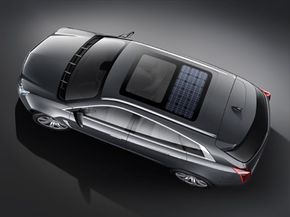Pros and Cons of Solar-powered Cars
While they are still a possibility, solar-powered cars are a long way off. There are a number of practical problems with solar-powered cars. Most importantly, it's difficult for the car's solar array to gather enough power to move the car. That's why most solar race cars only carry one person -- the extra weight of a passenger would tax the car's power.
The way solar cars gather and store power is also a big issue. Solar power makes sense for buildings, the space station and even satellites because those structures are regularly exposed to the sun. These applications also have the ability to use batteries to store the energy the sun generates. A large battery pack -- with enough storage to power the car from sunset to sunrise -- would make an electric car far too heavy, so a solar-powered car must be in the sun at nearly all times to be effective. That means solar-powered cars aren't very practical if you're in a tunnel, a covered parking garage or even if it's cloudy. Building rooftops, the space station and satellites also have the space for much bigger, more powerful solar arrays that allow them to gather more energy. For a car to harness the equivalent amount of energy, the vehicle proportions would have to be huge.
Advertisement
Beyond that, there's the high cost of the solar panels. The type of solar panels used on solar-powered cars is very expensive. In fact, a competitive solar-powered race car can cost hundreds of thousands of dollars -- and as we've already mentioned, currently, there's not a very good way to make the car useable when the sun isn't out.
With that said, all of the hard work that's gone into solar-powered cars hasn't been a waste. The information that engineers have learned from building solar-powered cars has guided their work in other areas. This includes aiding in the development of smaller, more efficient solar arrays, as well as the development of solar panels that can be attached to gasoline-powered cars to increase their efficiency and decrease their fuel consumption. While solar-powered cars really aren't a possibility in the near future, there's no reason to completely write off the idea. With continued research, they may eventually become a more practical solution.
For more information about solar power, solar-powered vehicles and other related topics, follow the links below.
Related HowStuffWorks Articles
More Great Links
Sources
- Guilbaud, Antoine. "2009 Toyota Prius: Spy Report." Popular Mechanics. March 2007. http://www.popularmechanics.com/automotive/new_cars/4212545.html
- Miller, Paul. "Cadillac Provoq is latest host for GM's E-Flex fuel cell powertrain." Engadget.com. January 9, 2008. http://www.engadget.com/2008/01/09/cadillac-provoq-is-latest-host-for-gms-e-flex-fuel-cell-powertr/
- Olson, Geoff. "Sun may soon shine on solar-powered revolution." Vancouver Courier. August 29, 2008. http://www.canada.com/vancouvercourier/news/opinion/story.html?id=efcb05de-512e-478b-b315-994fc411fdbb
- Stewart, Ben. "2009 Toyota Prius Plug-in Hybrid Prototype: Test Drive." Popular Mechanics. October 22, 2007. http://www.popularmechanics.com/automotive/new_cars/4227944.html
- Wasef, Basem. "Cadillac Provoq Concept Plugs in to Volt Tech: Detroit Auto Show Preview @ CES." Popular Mechanics. January 8, 2008. http://www.popularmechanics.com/blogs/automotive_news/4243825.html?series=19
